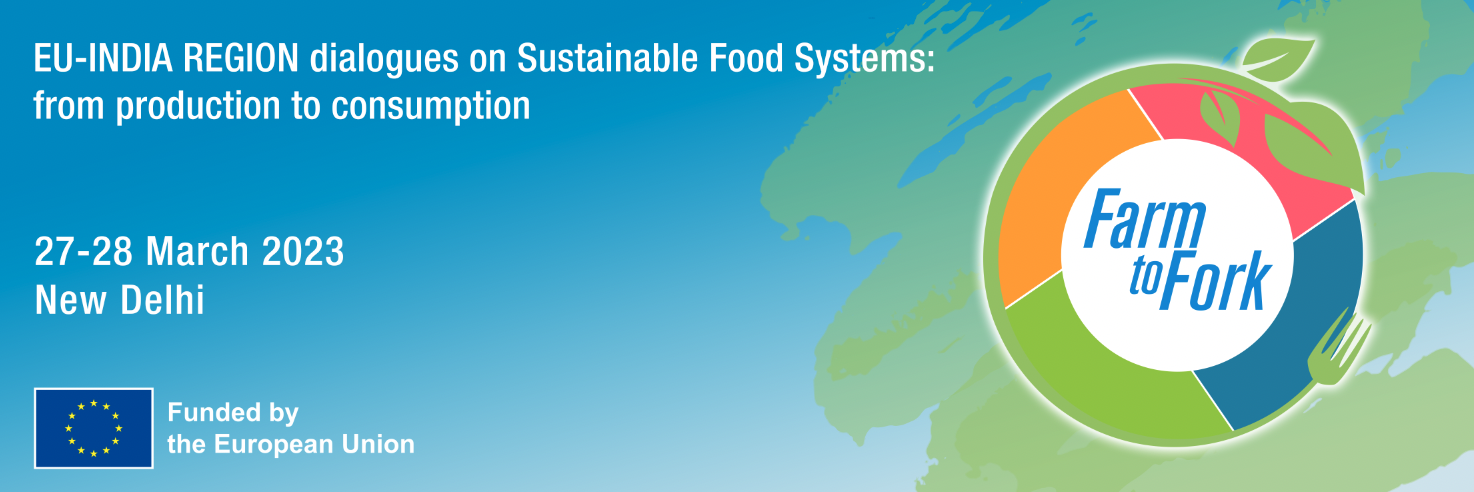EU and South Asia policy makers and experts gathered in Delhi to discuss strategies to combat the looming global food and climate crisis
Brussels – 4 April 2023: The talks between the EU and 5 countries in South Asian region were held 27-28 March 2023 at the Sheraton New Delhi and online, as part of EU-funded workshop series supporting the ‘Farm to Fork’ (F2F) Strategy put in place by the EU in the context of the wider ‘Green Deal’. Stakeholders from India, Bhutan, Sri Lanka, Bangladesh and Nepal have expressed similar concerns regarding the environmental degradation caused by agriculture and farming as well issues of food security, healthy nutrition and food waste reduction. All agreed that holistic and long term actions must be put in place.
The COVID-19 pandemic, the Ukraine crisis and ongoing extreme weather conditions caused by climate change, have disrupted global food supply chains and communities around the world, causing a risk of food insecurity and food related health threats such as hunger or obesity. In addition, current food production, transport and processing methods are one of the largest contributors to global warming with 21-37% of greenhouse gas emissions attributed to food chains.
Opening the Workshop, Ms Claire Bury -Deputy Director General for Food Sustainability Responsible for Directorates E, F and G, DG SANTE, EU Commission- stated that : “in Europe, our citizens continue to express their concerns about the climate and biodiversity loss. Their recommendations support the sustainability policies we are developing, and the cooperative work we want to develop with the South Asian countries set out the way forward”. Dr Koen Van Dyck -Head of Unit A5 Bilateral International Relations, DG SANTE, EU Commission- emphasized that “we have to work together, exchange information and build alliances: the need for global action is clear.” Rightfully, “we must not leave this to future generations: Food systems are a complex concept and a much bigger challenge than the green revolution in the 1950s & 60s”, urged Dr Shahidur Rashid -Director for South Asia at IFPRI in India.
This workshop allowed dialogues between the EU and four neighbouring countries of India (Bhutan, Sri Lanka, Nepal and Bangladesh) in order to exchange views regarding Soil health and organic production; sustainable use of pesticides and antimicrobials; and food loss and waste. “Promoting the shift towards healthy, sustainable diets has to be done through collaboration. The food system is everyone’s business” said Mr Atul Upadhyay -President of Food Scientists and Technologists Association, Nepal.
Insisting on diversifying diets which can be a key driver in the change to sustainable food systems, Mr Jamie Morrison -Senior Advisor Policy and External Relations, GAIN Bangladesh- asserted that “Data is key to identifying and prioritising actions.”
As a recommendation, “the system in Bhutan needs to transform from subsistence farming to a commercial system where rural income is improved and increased”, insisted Mr Karma Tshering -Chief of Policy & Planning Division at the Ministry of Agriculture and Livestock, Bhutan. In Sri Lanka, the niche market of organic products should be developed not only for export, but also for the domestic market: “Organic farming is happening on a small scale and we encourage those who want to do it” says Ms Malathy Parasuraman -Director General of the Department of Agriculture, Ministry of Agriculture in Sri Lanka.
Bearing in mind that as part of the its Green Deal, the EU has proposed ambitious actions and commitments to transform its food systems (the Farm to Fork Strategy) into global standards for competitive sustainability, the protection of human and planetary health as well as the livelihoods of all actors in the food value chain, Ms Cristina Laso Sanz -Deputy Head of Unit A5 (Bilateral International Relations) at EC DG SANTE- closed the Workshop by reassuring that “we do not seek to impose the EU’s views and goals and the ways to achieve them; we want to build alliances. We are in this together.”
Background information:
The adjustment of food systems, which were also documented and called upon in the UN Food Systems Summit in September 2021, needs to take into account the various contextual differences across the planet regarding cross cutting issues such as land degradation or food loss that ultimately affect how food is produced, processed, transported and consumed.
The question of sustainable food systems goes beyond the means of production and is also subjected to several nutrition challenges such as undernutrition and hunger. These challenges persist while new and multiple forms of malnutrition rise. In particular, food-borne non-communicable diseases such as cancer, obesity, and cardiovascular conditions put pressure on people and health systems.
Although global awareness grows, commitments are made and some solutions are designed and implemented, there is still a need for rapid and firmer action to foster a worldwide cooperation and coordination.
This series of regional and country-focused workshops is funded by the European Commission’s Service for Foreign Policy Instruments (FPI) under the project supporting the Farm to Fork Strategy (F2F), which is the EU plan to contribute to resolving food challenges, and, to this end, proposes pathways for change towards sustainability that provides environmental, health, social and economic benefits.
More details of the European Commission’s Farm to Fork strategy are available here and on Social Media channels with the tags:
@EU_FPI
#EUForeignPolicy
For more information, please contact:
“F2F – Farm to Fork” Project Secretariat (General organisation):
Philippe van Maldeghem – farm2forkdialogue@candm.sk



